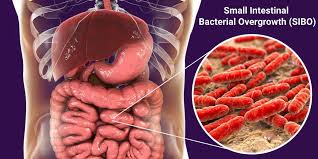
Small Intestinal Bacterial Overgrowth – SIBO Test, Symptoms, and Treatment
Small Intestinal Bacterial Overgrowth (SIBO) – Test, Symptoms, and Treatment
What is SIBO?
Small Intestinal Bacterial Overgrowth (SIBO) occurs when there is an abnormal increase in the number or type of bacteria in the small intestine. While the large intestine naturally houses a large number of bacteria, the small intestine typically has fewer. In SIBO, bacteria from the colon migrate to the small intestine or multiply excessively, disrupting digestion and nutrient absorption.
Symptoms of SIBO
SIBO symptoms can range from mild to severe and often overlap with other digestive disorders like Irritable Bowel Syndrome (IBS) or lactose intolerance.
Digestive Symptoms:
- Bloating and Gas: Often severe and occurs shortly after meals.
- Abdominal Pain: Cramps or discomfort in the mid-abdomen.
- Diarrhea or Constipation: Loose stools or difficulty passing stools.
- Nausea: A feeling of discomfort or queasiness after eating.
Systemic Symptoms:
- Fatigue: Due to poor nutrient absorption.
- Unexplained Weight Loss: A result of malabsorption of calories.
- Nutritional Deficiencies: Deficiencies in vitamin B12, iron, and fat-soluble vitamins (A, D, E, K).
- Skin Issues: Rashes or acne-like breakouts.
Causes of SIBO
SIBO can be triggered by a variety of underlying conditions or lifestyle factors, including:
- Slow Gut Motility: Caused by disorders like diabetes, hypothyroidism, or scleroderma.
- Structural Abnormalities: Post-surgical changes, adhesions, or diverticula in the small intestine.
- Low Stomach Acid: Reduces the body’s ability to kill harmful bacteria.
- Immune Disorders: Conditions like HIV or chronic immune suppression.
- Medications: Long-term use of proton pump inhibitors (PPIs) or antibiotics.
How is SIBO Diagnosed?
SIBO Breath Test:
The hydrogen or methane breath test is the most common diagnostic tool. Here’s how it works:
- You consume a sugar solution (glucose or lactulose).
- Bacteria in the small intestine ferment the sugar, releasing hydrogen or methane gas.
- The gas levels are measured in your breath at regular intervals to determine bacterial overgrowth.
Additional Tests:
In some cases, doctors may use other methods like:
- Small Intestine Aspiration and Culture: A direct sample of intestinal fluid.
- Blood Tests: To check for nutritional deficiencies or rule out other conditions.
Treatment Options for SIBO
1. Antibiotic Therapy
- Rifaximin: A non-absorbed antibiotic commonly used for hydrogen-dominant SIBO.
- Neomycin: Often combined with rifaximin for methane-dominant SIBO.
Antibiotics help reduce bacterial overgrowth but may require repeated courses in chronic cases.
2. Diet Modifications
Diet plays a key role in managing SIBO:
- Low FODMAP Diet: Eliminates fermentable carbohydrates that feed bacteria.
- Specific Carbohydrate Diet (SCD): Limits complex carbohydrates to reduce fermentation.
- Elemental Diet: A liquid diet with easily absorbable nutrients, designed to "starve" bacteria.
3. Probiotics
Probiotics may help restore gut flora balance, though their use in SIBO is debated. Strains like Lactobacillus rhamnosus and Bifidobacterium infantis are often recommended.
4. Addressing Underlying Causes
- Gut Motility: Prokinetics like prucalopride or low-dose erythromycin may be prescribed.
- Nutritional Support: Supplements for vitamin deficiencies or malnutrition.
Prevention of SIBO Recurrence
SIBO has a high recurrence rate, so long-term management is essential:
- Gut-Healthy Diet: Focus on fiber-rich, low-sugar meals.
- Address Motility Issues: Ensure regular bowel movements to prevent bacterial stagnation.
- Reduce Risk Factors: Avoid long-term PPI use or unnecessary antibiotics.
- Monitor Symptoms: Regular follow-ups to detect early signs of recurrence.
Final Thoughts
SIBO is a complex condition that can severely impact quality of life if left untreated. The key to effective management lies in accurate diagnosis, targeted treatment, and addressing any underlying causes. If you’re experiencing persistent digestive issues, consult a healthcare provider to determine whether SIBO might be the cause.

Share This News